Legal and Ethical Issues and Accountability in Health and Social Care
VerifiedAdded on 2022/12/14
|9
|2415
|250
Report
AI Summary
This report comprehensively examines the concept of accountability within health and social care practices. It highlights the multifaceted responsibilities of healthcare practitioners, encompassing self-accountability, patient rights, employer obligations, and the role of professional regulators. The report explores the four key types of accountability: autonomy, beneficence, non-maleficence, and justice, emphasizing their significance in ethical medical practice. It underscores the importance of accurate record-keeping, detailing how meticulous documentation supports effective communication, legal compliance, clinical research, and resource allocation. The report also addresses ethical rules and regulations, including respect for autonomy, beneficence, non-maleficence, and justice, concluding that accountability is paramount for upholding ethical standards and ensuring patient safety and well-being. This report provides a detailed overview of the legal and ethical considerations within healthcare.
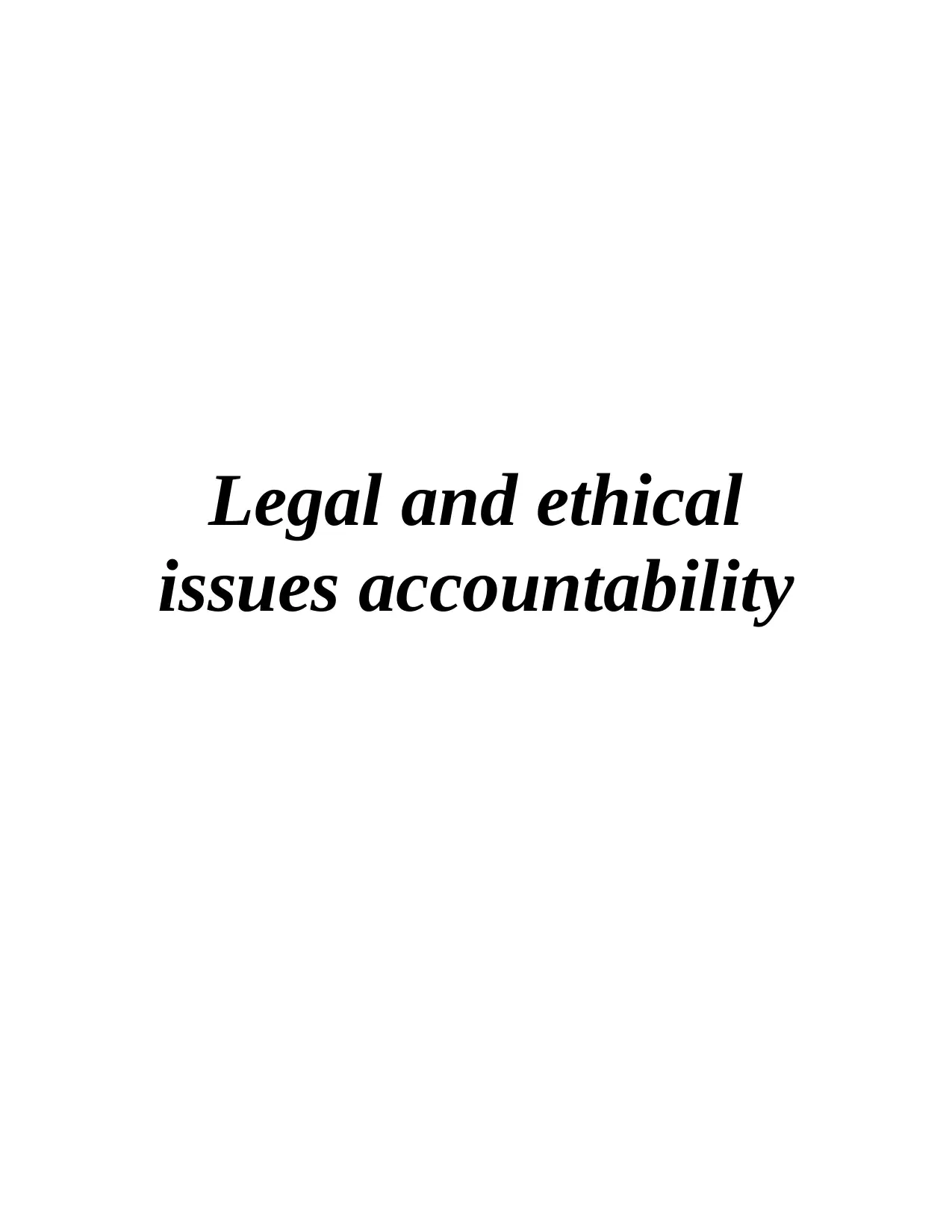
Legal and ethical
issues accountability
issues accountability
Paraphrase This Document
Need a fresh take? Get an instant paraphrase of this document with our AI Paraphraser
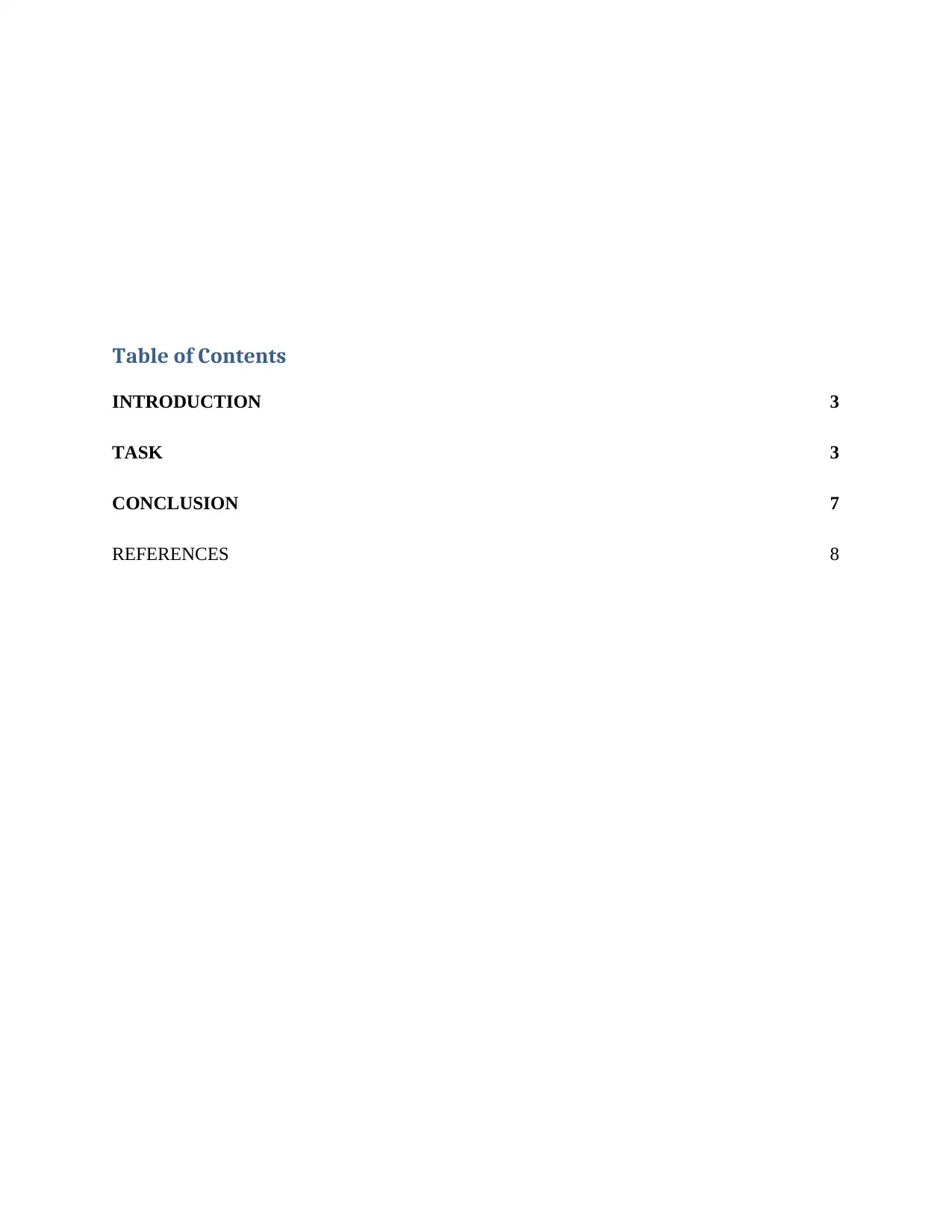
Table of Contents
INTRODUCTION 3
TASK 3
CONCLUSION 7
REFERENCES 8
INTRODUCTION 3
TASK 3
CONCLUSION 7
REFERENCES 8
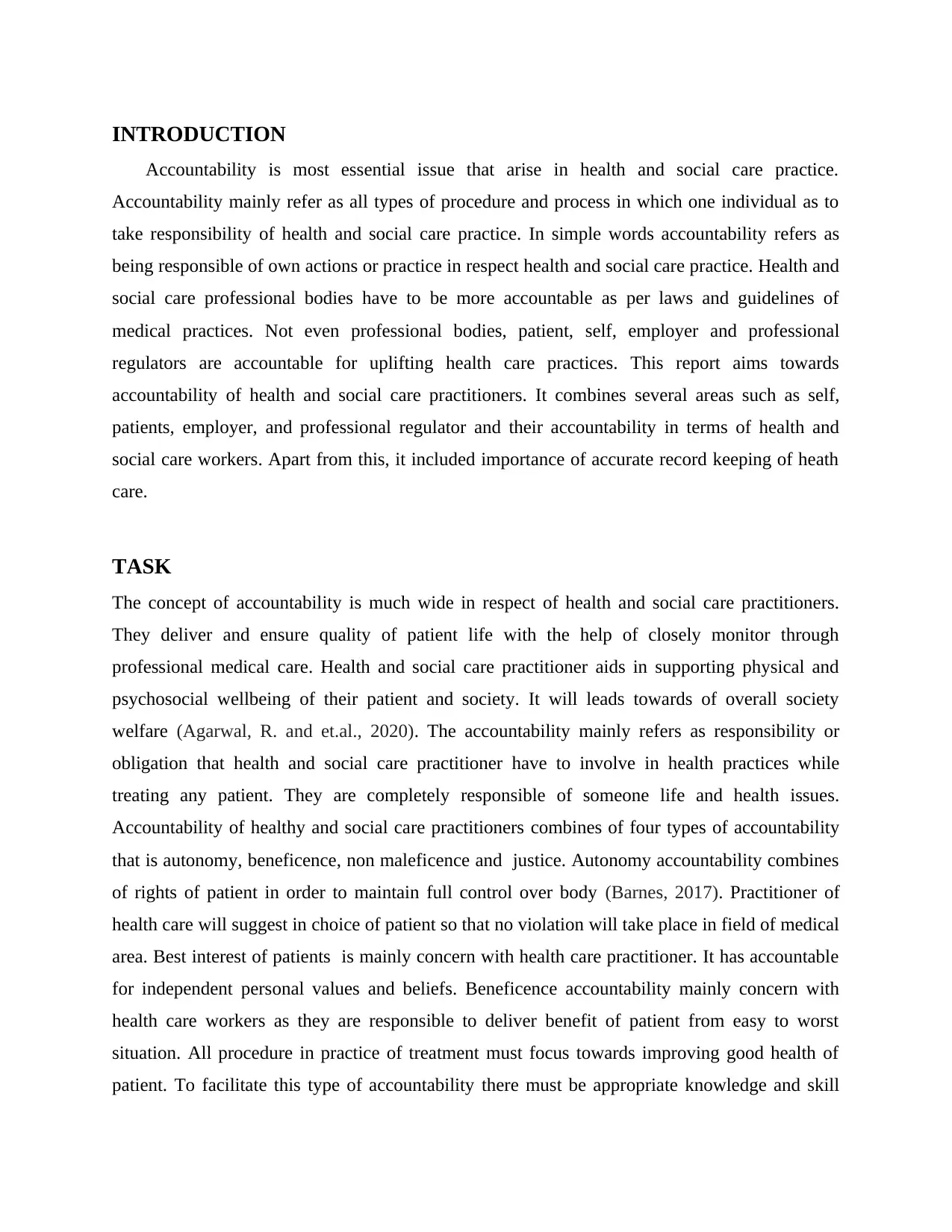
INTRODUCTION
Accountability is most essential issue that arise in health and social care practice.
Accountability mainly refer as all types of procedure and process in which one individual as to
take responsibility of health and social care practice. In simple words accountability refers as
being responsible of own actions or practice in respect health and social care practice. Health and
social care professional bodies have to be more accountable as per laws and guidelines of
medical practices. Not even professional bodies, patient, self, employer and professional
regulators are accountable for uplifting health care practices. This report aims towards
accountability of health and social care practitioners. It combines several areas such as self,
patients, employer, and professional regulator and their accountability in terms of health and
social care workers. Apart from this, it included importance of accurate record keeping of heath
care.
TASK
The concept of accountability is much wide in respect of health and social care practitioners.
They deliver and ensure quality of patient life with the help of closely monitor through
professional medical care. Health and social care practitioner aids in supporting physical and
psychosocial wellbeing of their patient and society. It will leads towards of overall society
welfare (Agarwal, R. and et.al., 2020). The accountability mainly refers as responsibility or
obligation that health and social care practitioner have to involve in health practices while
treating any patient. They are completely responsible of someone life and health issues.
Accountability of healthy and social care practitioners combines of four types of accountability
that is autonomy, beneficence, non maleficence and justice. Autonomy accountability combines
of rights of patient in order to maintain full control over body (Barnes, 2017). Practitioner of
health care will suggest in choice of patient so that no violation will take place in field of medical
area. Best interest of patients is mainly concern with health care practitioner. It has accountable
for independent personal values and beliefs. Beneficence accountability mainly concern with
health care workers as they are responsible to deliver benefit of patient from easy to worst
situation. All procedure in practice of treatment must focus towards improving good health of
patient. To facilitate this type of accountability there must be appropriate knowledge and skill
Accountability is most essential issue that arise in health and social care practice.
Accountability mainly refer as all types of procedure and process in which one individual as to
take responsibility of health and social care practice. In simple words accountability refers as
being responsible of own actions or practice in respect health and social care practice. Health and
social care professional bodies have to be more accountable as per laws and guidelines of
medical practices. Not even professional bodies, patient, self, employer and professional
regulators are accountable for uplifting health care practices. This report aims towards
accountability of health and social care practitioners. It combines several areas such as self,
patients, employer, and professional regulator and their accountability in terms of health and
social care workers. Apart from this, it included importance of accurate record keeping of heath
care.
TASK
The concept of accountability is much wide in respect of health and social care practitioners.
They deliver and ensure quality of patient life with the help of closely monitor through
professional medical care. Health and social care practitioner aids in supporting physical and
psychosocial wellbeing of their patient and society. It will leads towards of overall society
welfare (Agarwal, R. and et.al., 2020). The accountability mainly refers as responsibility or
obligation that health and social care practitioner have to involve in health practices while
treating any patient. They are completely responsible of someone life and health issues.
Accountability of healthy and social care practitioners combines of four types of accountability
that is autonomy, beneficence, non maleficence and justice. Autonomy accountability combines
of rights of patient in order to maintain full control over body (Barnes, 2017). Practitioner of
health care will suggest in choice of patient so that no violation will take place in field of medical
area. Best interest of patients is mainly concern with health care practitioner. It has accountable
for independent personal values and beliefs. Beneficence accountability mainly concern with
health care workers as they are responsible to deliver benefit of patient from easy to worst
situation. All procedure in practice of treatment must focus towards improving good health of
patient. To facilitate this type of accountability there must be appropriate knowledge and skill
⊘ This is a preview!⊘
Do you want full access?
Subscribe today to unlock all pages.

Trusted by 1+ million students worldwide
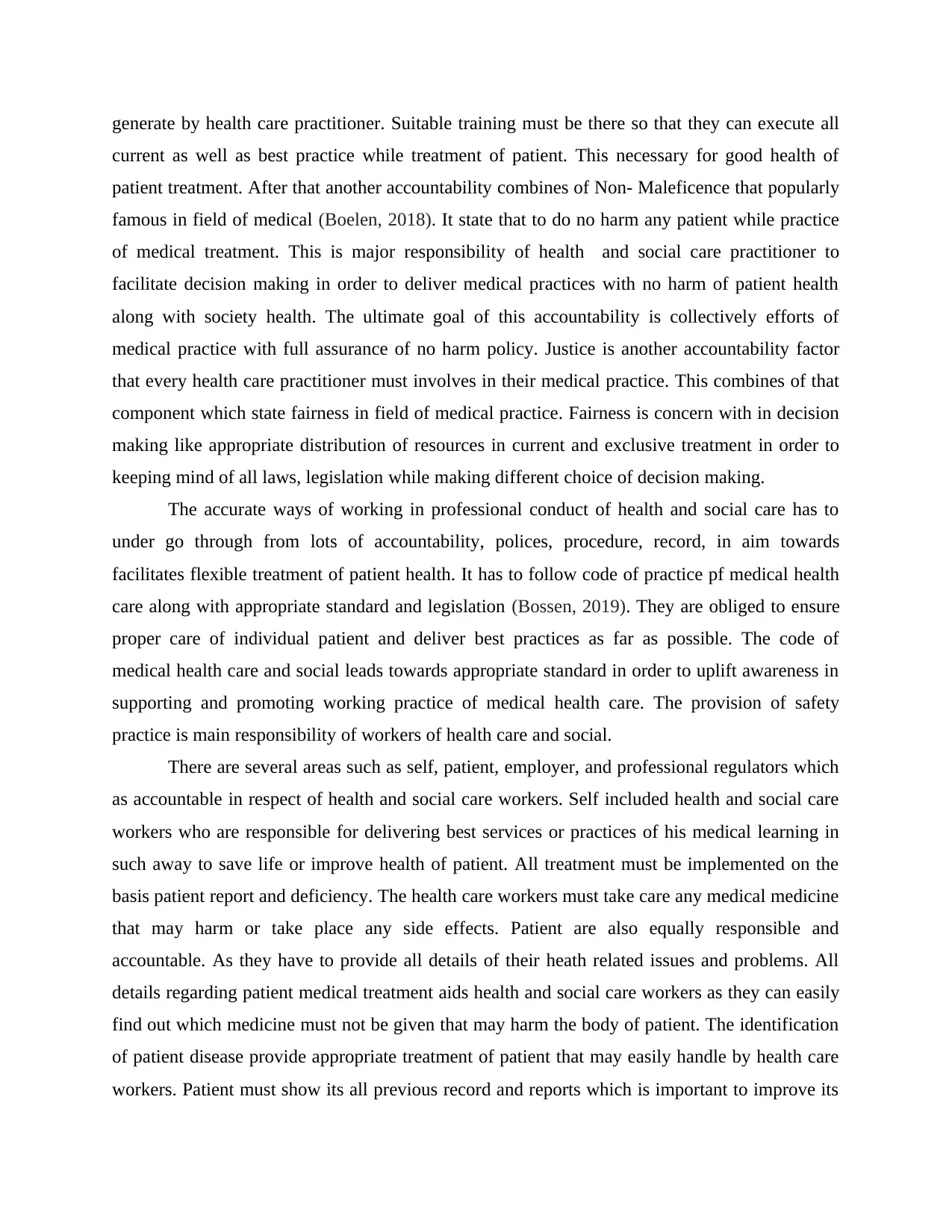
generate by health care practitioner. Suitable training must be there so that they can execute all
current as well as best practice while treatment of patient. This necessary for good health of
patient treatment. After that another accountability combines of Non- Maleficence that popularly
famous in field of medical (Boelen, 2018). It state that to do no harm any patient while practice
of medical treatment. This is major responsibility of health and social care practitioner to
facilitate decision making in order to deliver medical practices with no harm of patient health
along with society health. The ultimate goal of this accountability is collectively efforts of
medical practice with full assurance of no harm policy. Justice is another accountability factor
that every health care practitioner must involves in their medical practice. This combines of that
component which state fairness in field of medical practice. Fairness is concern with in decision
making like appropriate distribution of resources in current and exclusive treatment in order to
keeping mind of all laws, legislation while making different choice of decision making.
The accurate ways of working in professional conduct of health and social care has to
under go through from lots of accountability, polices, procedure, record, in aim towards
facilitates flexible treatment of patient health. It has to follow code of practice pf medical health
care along with appropriate standard and legislation (Bossen, 2019). They are obliged to ensure
proper care of individual patient and deliver best practices as far as possible. The code of
medical health care and social leads towards appropriate standard in order to uplift awareness in
supporting and promoting working practice of medical health care. The provision of safety
practice is main responsibility of workers of health care and social.
There are several areas such as self, patient, employer, and professional regulators which
as accountable in respect of health and social care workers. Self included health and social care
workers who are responsible for delivering best services or practices of his medical learning in
such away to save life or improve health of patient. All treatment must be implemented on the
basis patient report and deficiency. The health care workers must take care any medical medicine
that may harm or take place any side effects. Patient are also equally responsible and
accountable. As they have to provide all details of their heath related issues and problems. All
details regarding patient medical treatment aids health and social care workers as they can easily
find out which medicine must not be given that may harm the body of patient. The identification
of patient disease provide appropriate treatment of patient that may easily handle by health care
workers. Patient must show its all previous record and reports which is important to improve its
current as well as best practice while treatment of patient. This necessary for good health of
patient treatment. After that another accountability combines of Non- Maleficence that popularly
famous in field of medical (Boelen, 2018). It state that to do no harm any patient while practice
of medical treatment. This is major responsibility of health and social care practitioner to
facilitate decision making in order to deliver medical practices with no harm of patient health
along with society health. The ultimate goal of this accountability is collectively efforts of
medical practice with full assurance of no harm policy. Justice is another accountability factor
that every health care practitioner must involves in their medical practice. This combines of that
component which state fairness in field of medical practice. Fairness is concern with in decision
making like appropriate distribution of resources in current and exclusive treatment in order to
keeping mind of all laws, legislation while making different choice of decision making.
The accurate ways of working in professional conduct of health and social care has to
under go through from lots of accountability, polices, procedure, record, in aim towards
facilitates flexible treatment of patient health. It has to follow code of practice pf medical health
care along with appropriate standard and legislation (Bossen, 2019). They are obliged to ensure
proper care of individual patient and deliver best practices as far as possible. The code of
medical health care and social leads towards appropriate standard in order to uplift awareness in
supporting and promoting working practice of medical health care. The provision of safety
practice is main responsibility of workers of health care and social.
There are several areas such as self, patient, employer, and professional regulators which
as accountable in respect of health and social care workers. Self included health and social care
workers who are responsible for delivering best services or practices of his medical learning in
such away to save life or improve health of patient. All treatment must be implemented on the
basis patient report and deficiency. The health care workers must take care any medical medicine
that may harm or take place any side effects. Patient are also equally responsible and
accountable. As they have to provide all details of their heath related issues and problems. All
details regarding patient medical treatment aids health and social care workers as they can easily
find out which medicine must not be given that may harm the body of patient. The identification
of patient disease provide appropriate treatment of patient that may easily handle by health care
workers. Patient must show its all previous record and reports which is important to improve its
Paraphrase This Document
Need a fresh take? Get an instant paraphrase of this document with our AI Paraphraser
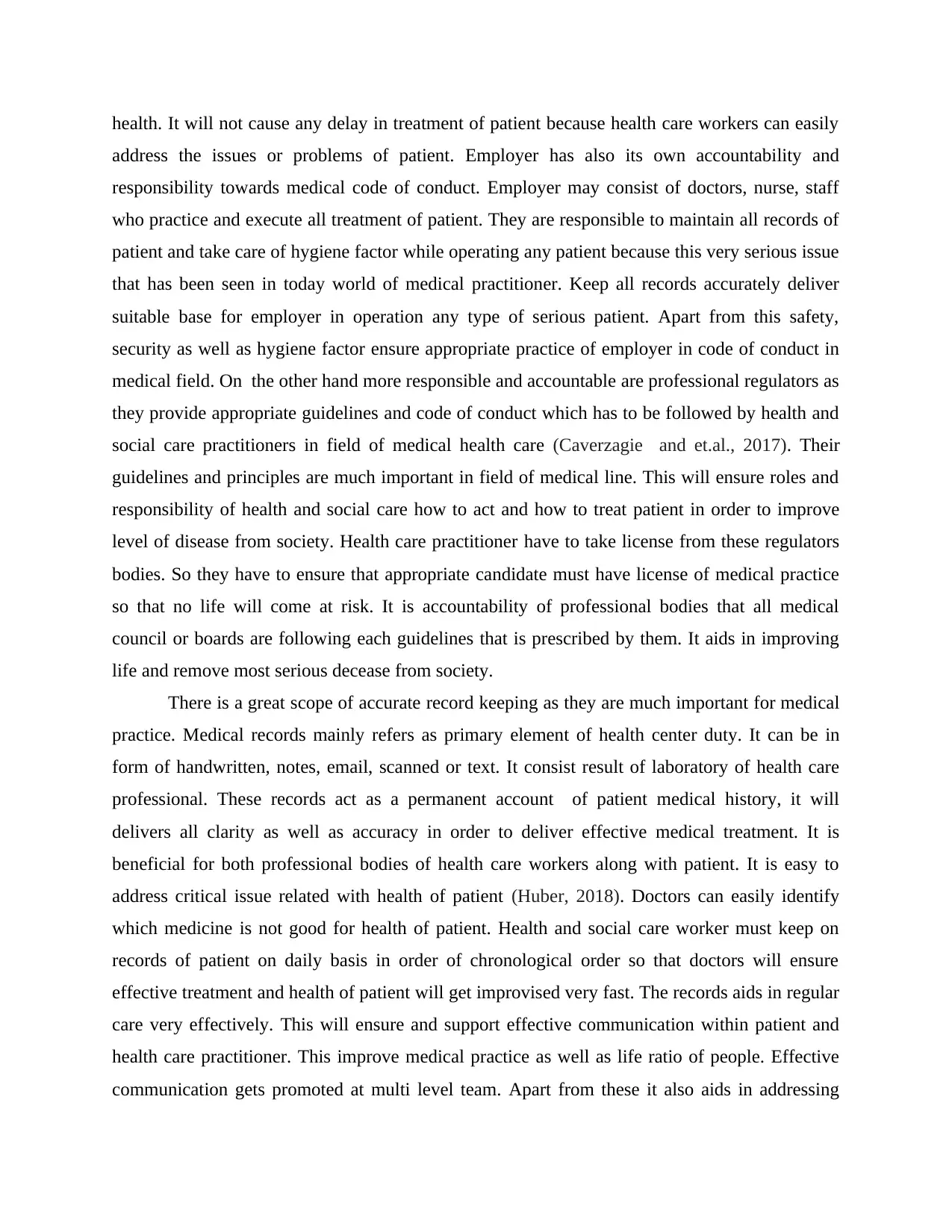
health. It will not cause any delay in treatment of patient because health care workers can easily
address the issues or problems of patient. Employer has also its own accountability and
responsibility towards medical code of conduct. Employer may consist of doctors, nurse, staff
who practice and execute all treatment of patient. They are responsible to maintain all records of
patient and take care of hygiene factor while operating any patient because this very serious issue
that has been seen in today world of medical practitioner. Keep all records accurately deliver
suitable base for employer in operation any type of serious patient. Apart from this safety,
security as well as hygiene factor ensure appropriate practice of employer in code of conduct in
medical field. On the other hand more responsible and accountable are professional regulators as
they provide appropriate guidelines and code of conduct which has to be followed by health and
social care practitioners in field of medical health care (Caverzagie and et.al., 2017). Their
guidelines and principles are much important in field of medical line. This will ensure roles and
responsibility of health and social care how to act and how to treat patient in order to improve
level of disease from society. Health care practitioner have to take license from these regulators
bodies. So they have to ensure that appropriate candidate must have license of medical practice
so that no life will come at risk. It is accountability of professional bodies that all medical
council or boards are following each guidelines that is prescribed by them. It aids in improving
life and remove most serious decease from society.
There is a great scope of accurate record keeping as they are much important for medical
practice. Medical records mainly refers as primary element of health center duty. It can be in
form of handwritten, notes, email, scanned or text. It consist result of laboratory of health care
professional. These records act as a permanent account of patient medical history, it will
delivers all clarity as well as accuracy in order to deliver effective medical treatment. It is
beneficial for both professional bodies of health care workers along with patient. It is easy to
address critical issue related with health of patient (Huber, 2018). Doctors can easily identify
which medicine is not good for health of patient. Health and social care worker must keep on
records of patient on daily basis in order of chronological order so that doctors will ensure
effective treatment and health of patient will get improvised very fast. The records aids in regular
care very effectively. This will ensure and support effective communication within patient and
health care practitioner. This improve medical practice as well as life ratio of people. Effective
communication gets promoted at multi level team. Apart from these it also aids in addressing
address the issues or problems of patient. Employer has also its own accountability and
responsibility towards medical code of conduct. Employer may consist of doctors, nurse, staff
who practice and execute all treatment of patient. They are responsible to maintain all records of
patient and take care of hygiene factor while operating any patient because this very serious issue
that has been seen in today world of medical practitioner. Keep all records accurately deliver
suitable base for employer in operation any type of serious patient. Apart from this safety,
security as well as hygiene factor ensure appropriate practice of employer in code of conduct in
medical field. On the other hand more responsible and accountable are professional regulators as
they provide appropriate guidelines and code of conduct which has to be followed by health and
social care practitioners in field of medical health care (Caverzagie and et.al., 2017). Their
guidelines and principles are much important in field of medical line. This will ensure roles and
responsibility of health and social care how to act and how to treat patient in order to improve
level of disease from society. Health care practitioner have to take license from these regulators
bodies. So they have to ensure that appropriate candidate must have license of medical practice
so that no life will come at risk. It is accountability of professional bodies that all medical
council or boards are following each guidelines that is prescribed by them. It aids in improving
life and remove most serious decease from society.
There is a great scope of accurate record keeping as they are much important for medical
practice. Medical records mainly refers as primary element of health center duty. It can be in
form of handwritten, notes, email, scanned or text. It consist result of laboratory of health care
professional. These records act as a permanent account of patient medical history, it will
delivers all clarity as well as accuracy in order to deliver effective medical treatment. It is
beneficial for both professional bodies of health care workers along with patient. It is easy to
address critical issue related with health of patient (Huber, 2018). Doctors can easily identify
which medicine is not good for health of patient. Health and social care worker must keep on
records of patient on daily basis in order of chronological order so that doctors will ensure
effective treatment and health of patient will get improvised very fast. The records aids in regular
care very effectively. This will ensure and support effective communication within patient and
health care practitioner. This improve medical practice as well as life ratio of people. Effective
communication gets promoted at multi level team. Apart from these it also aids in addressing
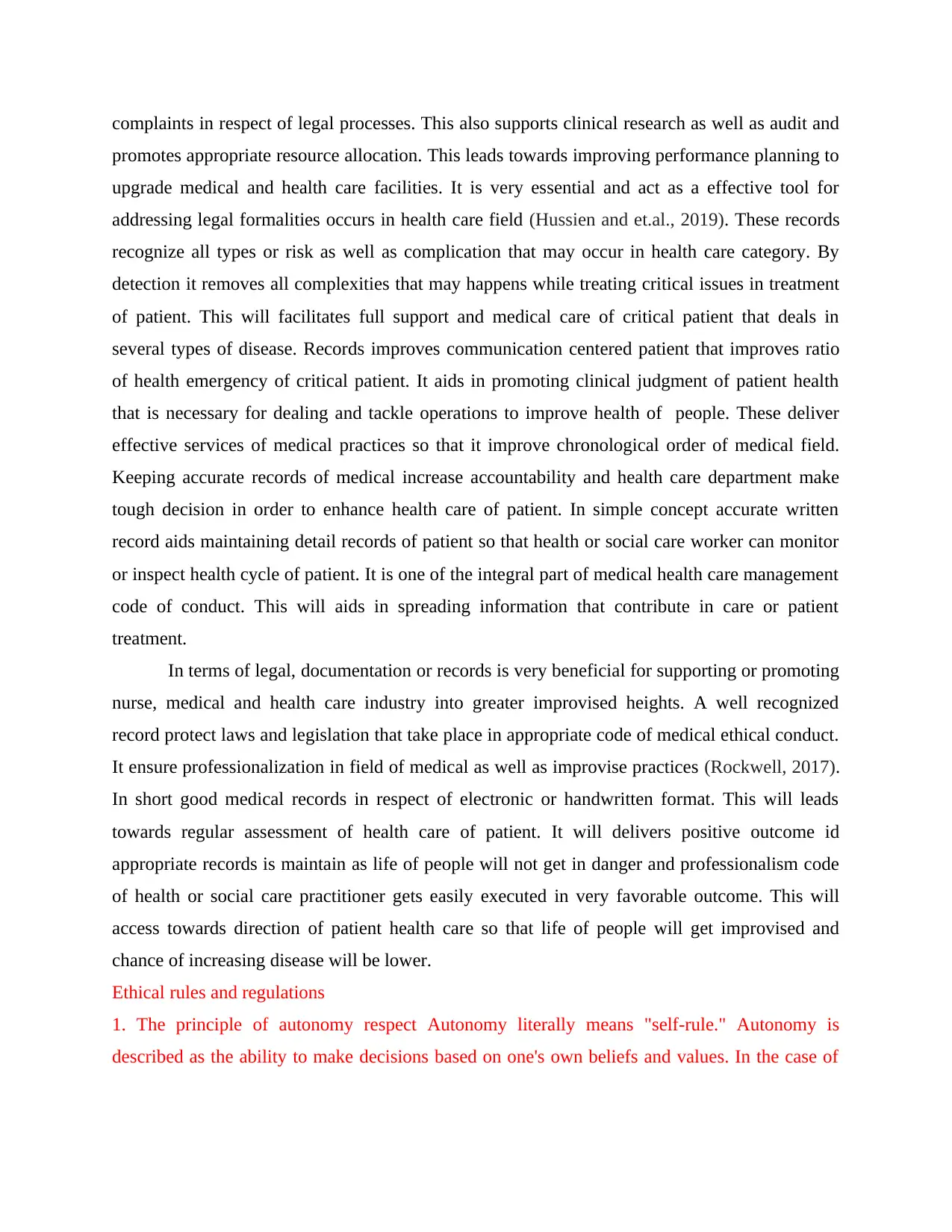
complaints in respect of legal processes. This also supports clinical research as well as audit and
promotes appropriate resource allocation. This leads towards improving performance planning to
upgrade medical and health care facilities. It is very essential and act as a effective tool for
addressing legal formalities occurs in health care field (Hussien and et.al., 2019). These records
recognize all types or risk as well as complication that may occur in health care category. By
detection it removes all complexities that may happens while treating critical issues in treatment
of patient. This will facilitates full support and medical care of critical patient that deals in
several types of disease. Records improves communication centered patient that improves ratio
of health emergency of critical patient. It aids in promoting clinical judgment of patient health
that is necessary for dealing and tackle operations to improve health of people. These deliver
effective services of medical practices so that it improve chronological order of medical field.
Keeping accurate records of medical increase accountability and health care department make
tough decision in order to enhance health care of patient. In simple concept accurate written
record aids maintaining detail records of patient so that health or social care worker can monitor
or inspect health cycle of patient. It is one of the integral part of medical health care management
code of conduct. This will aids in spreading information that contribute in care or patient
treatment.
In terms of legal, documentation or records is very beneficial for supporting or promoting
nurse, medical and health care industry into greater improvised heights. A well recognized
record protect laws and legislation that take place in appropriate code of medical ethical conduct.
It ensure professionalization in field of medical as well as improvise practices (Rockwell, 2017).
In short good medical records in respect of electronic or handwritten format. This will leads
towards regular assessment of health care of patient. It will delivers positive outcome id
appropriate records is maintain as life of people will not get in danger and professionalism code
of health or social care practitioner gets easily executed in very favorable outcome. This will
access towards direction of patient health care so that life of people will get improvised and
chance of increasing disease will be lower.
Ethical rules and regulations
1. The principle of autonomy respect Autonomy literally means "self-rule." Autonomy is
described as the ability to make decisions based on one's own beliefs and values. In the case of
promotes appropriate resource allocation. This leads towards improving performance planning to
upgrade medical and health care facilities. It is very essential and act as a effective tool for
addressing legal formalities occurs in health care field (Hussien and et.al., 2019). These records
recognize all types or risk as well as complication that may occur in health care category. By
detection it removes all complexities that may happens while treating critical issues in treatment
of patient. This will facilitates full support and medical care of critical patient that deals in
several types of disease. Records improves communication centered patient that improves ratio
of health emergency of critical patient. It aids in promoting clinical judgment of patient health
that is necessary for dealing and tackle operations to improve health of people. These deliver
effective services of medical practices so that it improve chronological order of medical field.
Keeping accurate records of medical increase accountability and health care department make
tough decision in order to enhance health care of patient. In simple concept accurate written
record aids maintaining detail records of patient so that health or social care worker can monitor
or inspect health cycle of patient. It is one of the integral part of medical health care management
code of conduct. This will aids in spreading information that contribute in care or patient
treatment.
In terms of legal, documentation or records is very beneficial for supporting or promoting
nurse, medical and health care industry into greater improvised heights. A well recognized
record protect laws and legislation that take place in appropriate code of medical ethical conduct.
It ensure professionalization in field of medical as well as improvise practices (Rockwell, 2017).
In short good medical records in respect of electronic or handwritten format. This will leads
towards regular assessment of health care of patient. It will delivers positive outcome id
appropriate records is maintain as life of people will not get in danger and professionalism code
of health or social care practitioner gets easily executed in very favorable outcome. This will
access towards direction of patient health care so that life of people will get improvised and
chance of increasing disease will be lower.
Ethical rules and regulations
1. The principle of autonomy respect Autonomy literally means "self-rule." Autonomy is
described as the ability to make decisions based on one's own beliefs and values. In the case of
⊘ This is a preview!⊘
Do you want full access?
Subscribe today to unlock all pages.

Trusted by 1+ million students worldwide
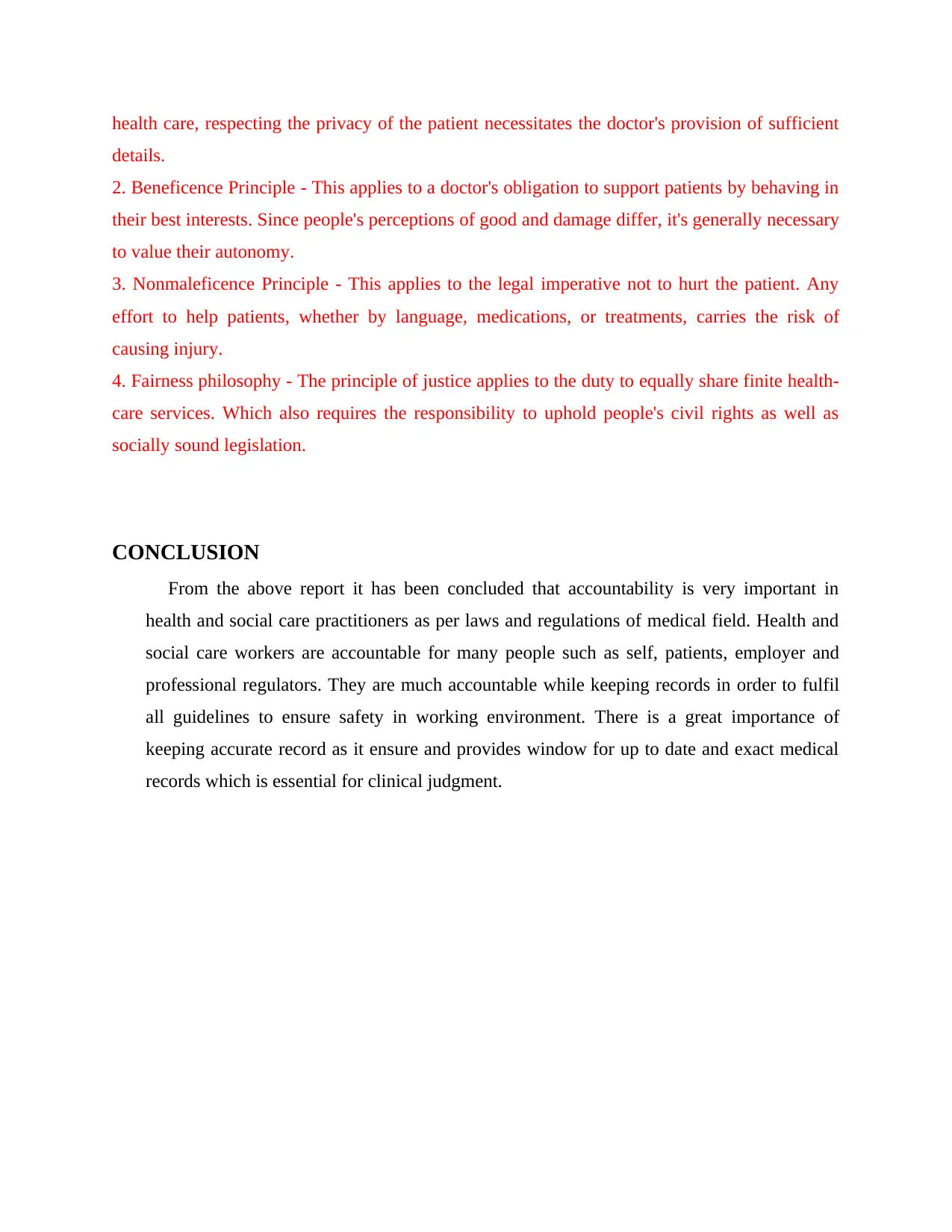
health care, respecting the privacy of the patient necessitates the doctor's provision of sufficient
details.
2. Beneficence Principle - This applies to a doctor's obligation to support patients by behaving in
their best interests. Since people's perceptions of good and damage differ, it's generally necessary
to value their autonomy.
3. Nonmaleficence Principle - This applies to the legal imperative not to hurt the patient. Any
effort to help patients, whether by language, medications, or treatments, carries the risk of
causing injury.
4. Fairness philosophy - The principle of justice applies to the duty to equally share finite health-
care services. Which also requires the responsibility to uphold people's civil rights as well as
socially sound legislation.
CONCLUSION
From the above report it has been concluded that accountability is very important in
health and social care practitioners as per laws and regulations of medical field. Health and
social care workers are accountable for many people such as self, patients, employer and
professional regulators. They are much accountable while keeping records in order to fulfil
all guidelines to ensure safety in working environment. There is a great importance of
keeping accurate record as it ensure and provides window for up to date and exact medical
records which is essential for clinical judgment.
details.
2. Beneficence Principle - This applies to a doctor's obligation to support patients by behaving in
their best interests. Since people's perceptions of good and damage differ, it's generally necessary
to value their autonomy.
3. Nonmaleficence Principle - This applies to the legal imperative not to hurt the patient. Any
effort to help patients, whether by language, medications, or treatments, carries the risk of
causing injury.
4. Fairness philosophy - The principle of justice applies to the duty to equally share finite health-
care services. Which also requires the responsibility to uphold people's civil rights as well as
socially sound legislation.
CONCLUSION
From the above report it has been concluded that accountability is very important in
health and social care practitioners as per laws and regulations of medical field. Health and
social care workers are accountable for many people such as self, patients, employer and
professional regulators. They are much accountable while keeping records in order to fulfil
all guidelines to ensure safety in working environment. There is a great importance of
keeping accurate record as it ensure and provides window for up to date and exact medical
records which is essential for clinical judgment.
Paraphrase This Document
Need a fresh take? Get an instant paraphrase of this document with our AI Paraphraser
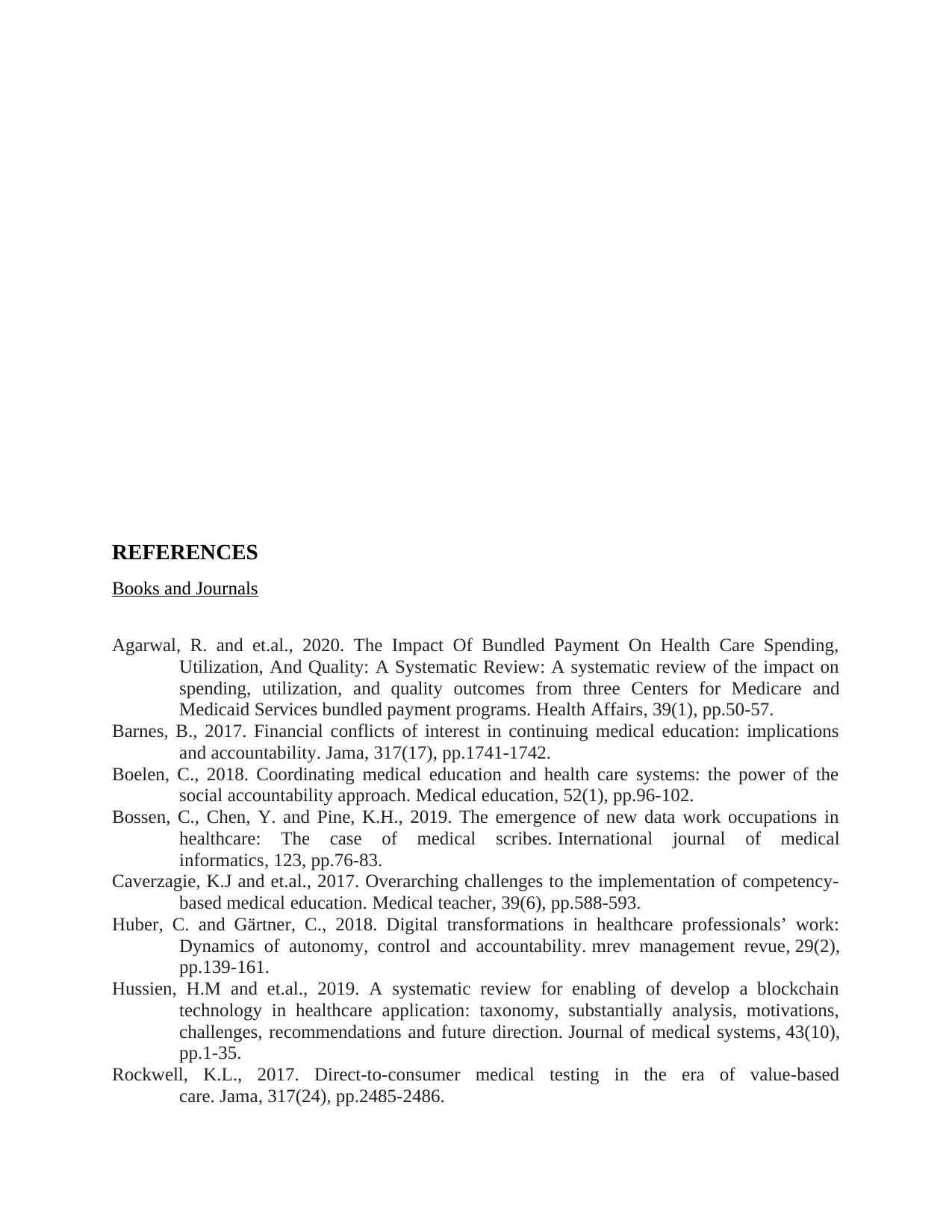
REFERENCES
Books and Journals
Agarwal, R. and et.al., 2020. The Impact Of Bundled Payment On Health Care Spending,
Utilization, And Quality: A Systematic Review: A systematic review of the impact on
spending, utilization, and quality outcomes from three Centers for Medicare and
Medicaid Services bundled payment programs. Health Affairs, 39(1), pp.50-57.
Barnes, B., 2017. Financial conflicts of interest in continuing medical education: implications
and accountability. Jama, 317(17), pp.1741-1742.
Boelen, C., 2018. Coordinating medical education and health care systems: the power of the
social accountability approach. Medical education, 52(1), pp.96-102.
Bossen, C., Chen, Y. and Pine, K.H., 2019. The emergence of new data work occupations in
healthcare: The case of medical scribes. International journal of medical
informatics, 123, pp.76-83.
Caverzagie, K.J and et.al., 2017. Overarching challenges to the implementation of competency-
based medical education. Medical teacher, 39(6), pp.588-593.
Huber, C. and Gärtner, C., 2018. Digital transformations in healthcare professionals’ work:
Dynamics of autonomy, control and accountability. mrev management revue, 29(2),
pp.139-161.
Hussien, H.M and et.al., 2019. A systematic review for enabling of develop a blockchain
technology in healthcare application: taxonomy, substantially analysis, motivations,
challenges, recommendations and future direction. Journal of medical systems, 43(10),
pp.1-35.
Rockwell, K.L., 2017. Direct-to-consumer medical testing in the era of value-based
care. Jama, 317(24), pp.2485-2486.
Books and Journals
Agarwal, R. and et.al., 2020. The Impact Of Bundled Payment On Health Care Spending,
Utilization, And Quality: A Systematic Review: A systematic review of the impact on
spending, utilization, and quality outcomes from three Centers for Medicare and
Medicaid Services bundled payment programs. Health Affairs, 39(1), pp.50-57.
Barnes, B., 2017. Financial conflicts of interest in continuing medical education: implications
and accountability. Jama, 317(17), pp.1741-1742.
Boelen, C., 2018. Coordinating medical education and health care systems: the power of the
social accountability approach. Medical education, 52(1), pp.96-102.
Bossen, C., Chen, Y. and Pine, K.H., 2019. The emergence of new data work occupations in
healthcare: The case of medical scribes. International journal of medical
informatics, 123, pp.76-83.
Caverzagie, K.J and et.al., 2017. Overarching challenges to the implementation of competency-
based medical education. Medical teacher, 39(6), pp.588-593.
Huber, C. and Gärtner, C., 2018. Digital transformations in healthcare professionals’ work:
Dynamics of autonomy, control and accountability. mrev management revue, 29(2),
pp.139-161.
Hussien, H.M and et.al., 2019. A systematic review for enabling of develop a blockchain
technology in healthcare application: taxonomy, substantially analysis, motivations,
challenges, recommendations and future direction. Journal of medical systems, 43(10),
pp.1-35.
Rockwell, K.L., 2017. Direct-to-consumer medical testing in the era of value-based
care. Jama, 317(24), pp.2485-2486.

⊘ This is a preview!⊘
Do you want full access?
Subscribe today to unlock all pages.

Trusted by 1+ million students worldwide
1 out of 9
Related Documents
Your All-in-One AI-Powered Toolkit for Academic Success.
+13062052269
info@desklib.com
Available 24*7 on WhatsApp / Email
![[object Object]](/_next/static/media/star-bottom.7253800d.svg)
Unlock your academic potential
Copyright © 2020–2026 A2Z Services. All Rights Reserved. Developed and managed by ZUCOL.





